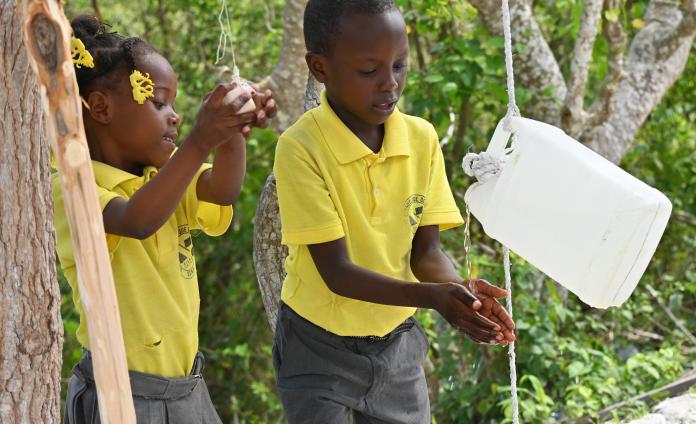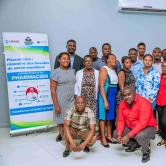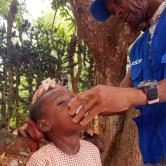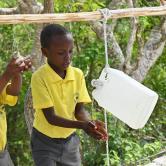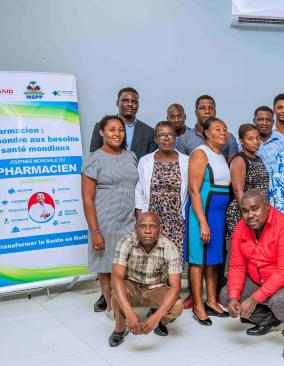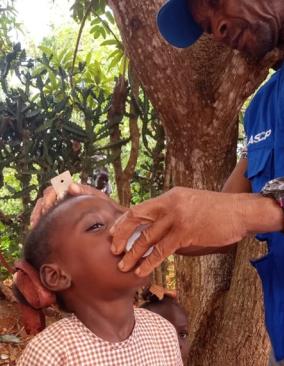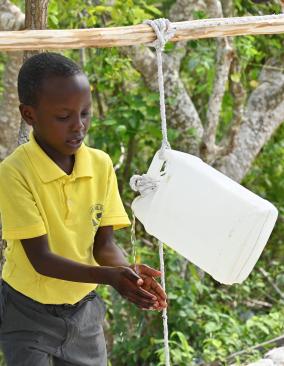Read our statement on the loss of our USAID funding the termination of the IHSD/Kore Sante program
In 2022, HEI began leading the Improved Health Service Delivery (IHSD) program: a five-year, USAID-funded project to improve access to high-quality health care in southern Haiti. The project is called Kore Sante (“Supporting Health”) in Haiti. In late 2024, USAID approved HEI to lead a countrywide expansion of the IHSD program, supporting healthcare facilities in every corner of Haiti. However, in early 2025 the U.S. Government terminated our contract and cancelled the program’s expansion as it began to dissolve the entire agency.
IHSD’s shocking and sudden termination has immediate and dangerous reprecussions for the people of Haiti during a time when humanitarian crisis is pushing the country towards collapse.
We are extraordinarily proud of what the IHSD program accomplished during its two years of operation. Below, we outlined the goals of the program and the tremendous impacts it had for tens of thousands of people in southern Haiti.
We also remain deeply committed to health system strengthening work and continue to support with our partner facilities wherever possible. We are currently pursuing every avenue possible to restart the project and continue improving
Overview of the Program
The IHSD/Kore Sante was a partnership between seven nongovernmental organizations (NGOs) and 31 public and private healthcare facilities in Haiti’s Grande Anse, Nippes, Sud, and Sud-Est departments. All participants worked under the guidance of the Haitian Ministry of Health centrally through the Director General’s Office and the Technical Directorates, and regionally through the Heads of the Departmental Directorates in the Southern region.
The goal of the project was to support these NGOs and their healthcare facilities in providing high-quality primary care services. The program also emphasized community health work to improve service delivery, provide community-level health education, and strengthen linkages between community- and facility-based care.
Through Kore Sante, HEI furthered its mission of ensuring that all people, regardless of their ability to pay, have access to dignified and compassionate health care.
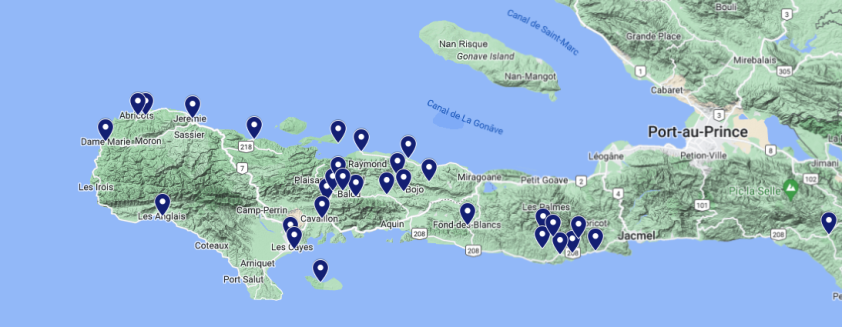
Kore Sante supports 31 healthcare facilities and surrounding communities.
Program Objectives
Kore Sante aimed to improve service delivery and quality of care across three objectives:
- Sexual, reproductive, maternal, newborn, child, and adolescent health and nutrition (SRMNCAH-N), including:
- Providing reproductive support to women of reproductive age and families with children under 5 years of age
- Increasing health literacy in communities
- Improving adherence to prenatal appointments
- Improving access to hospital-based deliveries
- Increasing demand for family planning
- Improve infection prevention and control through water, sanitation, and hygiene (WASH) activities
- HIV/AIDS, including:
- Providing quality testing services
- Immediately linking patients to care and antiretroviral therapy
- Improving adherence to treatment plans
- Resiliency, community empowerment, data for results, and resource optimization, including:
- Strengthening the Haitian health system and building local capacity to respond to disasters, shocks, and epidemics
- Improve healthcare waste management
- Improve infection prevention and control protocols
- Provide training on data collection, monitoring, and analysis to empower data-driven decisionmaking
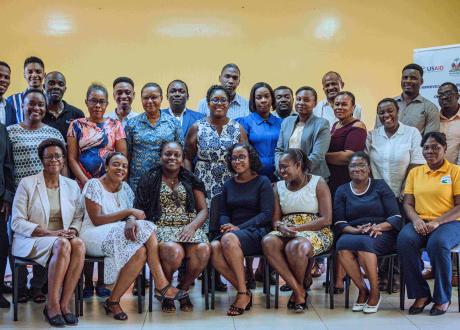
Participants in a symposium on health equity, organized for World Health Day 2024.
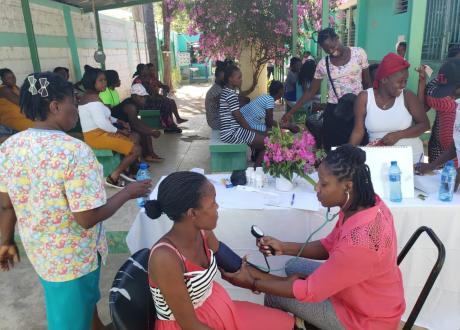
Kore Sante runs dozens of pregnancy clubs, increasing women’s access to prenatal care.
Training
Training was a core component of Kore Sante.
Healthcare providers from doctors to nurses’ aides participated in regular trainings focused on improving service delivery and quality of care. At every level, Kore Sante emphasized the importance of respectful, patient-centered care, equitable access to care, patient agency in treatment decisions, and collaboration with colleagues to improve patient outcomes.
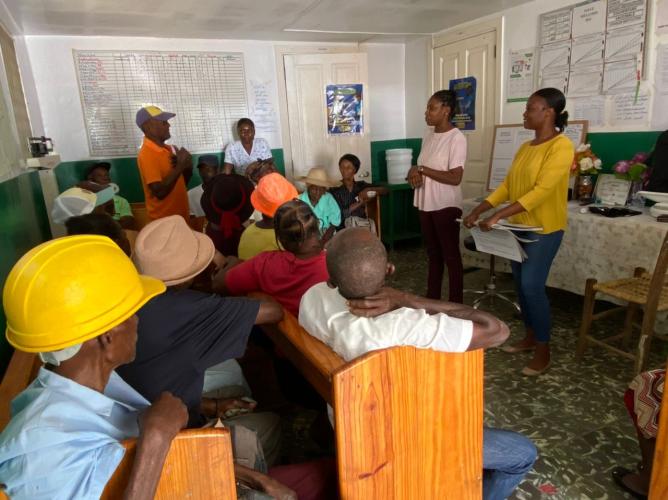
Training is a core component of Kore Sante.
Through specialized training, community health workers learned to leverage the trust they’ve built with the people they serve to promote health-seeking behaviors. Using strategies that include modeling positive behaviors at community health events and individual counseling as well as group education sessions, community health workers were able to play an greater role in improving their patients’ understanding of when and how to access health services.
Finally, Kore Sante used extensive training and coaching to improve data collection, monitoring, and evaluation systems and overall health governance, including mechanisms for oversight and accountability. These activities helped support stronger health systems that are more responsive to local needs.
Results
The results we achieved in southern Haiti in just two years—despite profound difficulties from the humanitarian crisis—were remarkable. Below, we’ve provided a small sampling of the individuals we treated and care we provided throughout the life of the project.
- 110,641 children under five who received nutrition-specific interventions, including providing parents with infant and young child feeding practices and direct food assistance
- 51,778 Women of reproductive age using a modern family planning method
- 35,684 Individuals tested for HIV
- 18,562 Babies delivered
- 14,681 Pregnant women attended four or more prenatal appointments
- 8,206 Children <1 year old fully vaccinated
- 7,000 “Tippy Tap” handwashing stations installed in communities throughout project area
- 4,119 C-sections performed
- 3,907 Children treated for severe or moderate acute malnutrition
- 2,620 Individuals on antiretroviral (ART) therapy, 85% of whom achieved viral suppression in the past 12 months
- 2,598 Individuals enrolled on pre-exposure prophylaxis (PrEP) to prevent HIV infection
- 682 Patients received specialized care after facing gender-based violence
- 267 Community health workers providing family planning information, referrals, and/or services
Impact
We published a number of stories highlighting IHSD/Kore Sante’s impact throughout the life of the project:
